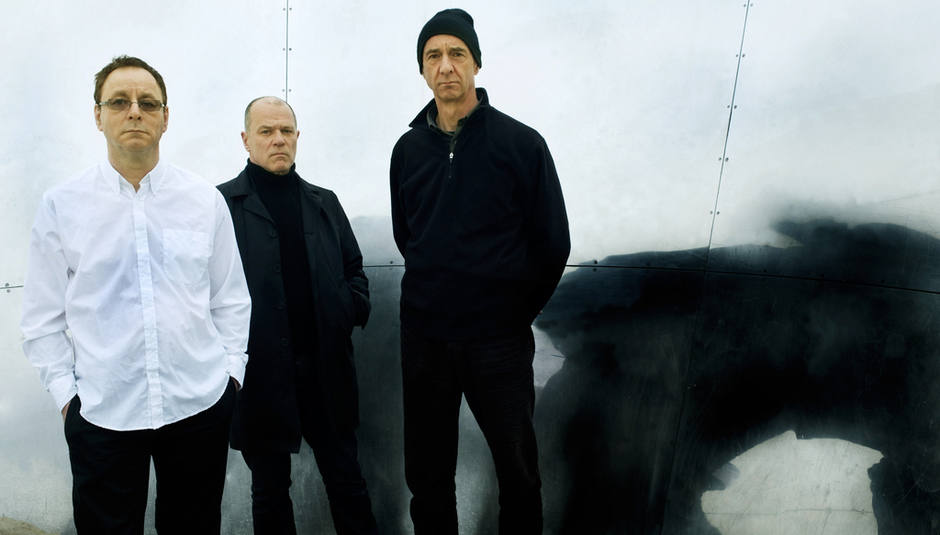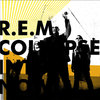In the same way that Wire are not a really band; this is not really an interview. Wire are rock and roll archetypes, post-punk prototypes. When they appeared in 1976 it was immediately apparent that this was a group who were approaching the notion of a band differently from any other band in history. Not as a unitary source of expression, but as a sort of fractured canvas, a template to which various processes could be applied. From singer Colin Newman’s tight parodic poses, to the effacement of solos in favour of machine-tooled rhythmic prints, to the analytical sense of structure - Wire’s approach has long seemed akin to Cubism, in which the approach self-consciously defines the object, and the point is to enumerate the facades, the planes, the possible positions, where letting yourself get too involved is to miss the point. Where the forthright control of relations is precisely the point.
Diagrams drawn on blue touchpaper, a series of structured insights, marshalled ideas and reveals; and yet still a group of lads with guitars. Wire’s greatest trick was to have this process, these controlled lines and potent bareness - all this art – not just serve as a rock and roll band, but to serve the very idea of a rock and roll band . So that this idea of “a band” held up to the light and examined, rather than becoming something awkward and estranged from rock and roll, became totally itself. Pure and prismatic. The logic of stripping back, rejecting fuss, of workmanlike focus, was both Wire’s radical thesis and Rock’s logical end-game. This was rock and roll essence. This was tradition renewed, a recognisable future made from a transfigured past. They wanted the rock dream, to get rich, to better and escape themselves. They also wanted to make abstract difficult art music. They found a way, for a while, to do both.
Wire remain amongst the great formal innovators of guitar music in this country. It’s no accident that My Bloody Valentine chose to cover Wire; both bands remain historical markers of what was possible for the rock guitar. In Shield’s and co’s case it was to unmoor the instrument, to have it float in retinal blushes and oedipal churn. In Wire’s case it was the opposite; to pinion it, to extract the maximum purity while eschewing all sense of authenticity and woolly expression. Both bands used process to derive something new; with Wire it was the unencumbered perception of the outsider, as overseer and machinery, tunnelling and boring to new seams, new materials, new definitions of rock and roll.
Colin Newman, Graham Lewis and Robert Grey (nee Gotobed) are sitting in the concourse of the Royal Festival Hall. They could be a band, these men in muted colours, they could be something else. That they self-identify as artists, typographers, photographers, fashion designers – is closer to the truth but not much help. If you want to learn Wire’s history there are books. If you want to gauge their effect there are tribute albums like Whore, covers by Minor Threat and My Bloody Valentine, countless referencing acts. If you want to learn their theology and methodology there are lyrics and innumerable interviews. And because Wire present themselves as a band and more than a band, it seems somehow appropriate to relate them as if they are terrain, or territory. So let’s call this a travel article. Wire are imagined geography.
So welcome to the land of innovation, of confidence, exploitation and exhaustion.
GL: Innovators make no money. This has always been a starving land ... And that makes it very difficult, what shall we say, for the establishment to invest heavily because they like things which do not move and can be easily exploited. That’s a different kind of production, we’re in the production of art. And art is a question that is continually moving, and formulating and responding to that is really, all you can do.... I think it does help if you’re your own cartologist … that’s what you are doing setting off on your own adventure, redrawing the map and erasing it as well, amending it. And you’ve got to be optimistic, in that sense.
CN: My personal geography. I sat in my bedroom in Watford in 1976 and decided I wanted to invent rock and roll, with the arrogance that only a 22 year old can have, and latterly I’ve described that process as taking the “and roll” out. because there was an awful lot of frippery, I don’t actually like rock and roll I don’t like it all, I hate 50s music, I hate black and white. I like colour. And I’ve always just thought, yeah, this is it. I felt that I was on the point of something, totally within my own head, nothing to do with the rest of the world.
GL: While Colin was having his epiphany in his bedroom in Watford, I was at art college in London, at Hornsey. And the thinking was that it would always be a good idea to have a group because it would give you possibility of working in something which at that point didn’t exist, which was basically like a multimedia world. Because it would give you access to doing all of the things you liked, which included you know, obviously music and noise and words, and image clothes, design. All sorts of logistics, performance all of those things. And a band became a good vehicle.
CN: ... But there was a problem, I mean post 154 up until fairly recently actually about the band having any agreed direction. There have been moments of freefall. I think one of the reasons that we did miss out at the end of the seventies and the early eighties is that band wasn’t really there, we were really screwed by doing a support tour for Roxy Music which was horrible. We earned no money from it, we were shafted more and more every night by their crew, who gave us less and less of everything, it was winter we were playing in these horrible sheds, y’know enormous sheds. And a pairing of 1979 Wire and 1973 Roxy Music [with Brian Eno] would’ve been a pairing made in heaven, but 1979 Roxy Music were a different thing altogether. Brian Ferry and his backing band. And we thought...
GL: Is this what we’ve got to look forward to?
CN: Is this what we’re doing it for?
GL: No.
CN: This looks shit. Is this what we’ve got to do to make money? No one signed up for that, nobody wanted that. We just had nobody around us, there was no culture, there was no “Indie” music culture, which could’ve just said, guys what you do is fantastic you don’t need to be doing things like that, because there’s another generation coming along and they see things differently or whatever. There was no-one there to say that to us. We just looked at that and thought that was really terrible, we don’t want to do that.
GL: It was really bizarre because, as Colin said, there was no indication that is was completely practical, for the rest of your life you could go on playing in front of 1500 people, in really nice places which are acoustically built for the job and it’s not against the law. It’s no crime. There wasn’t because there was this sort of pyramid trajectory of how you were supposed to “progress” as a band, onward toward the summit.
Moving onward, on our right we pass the establishment headquarters.
CN: To use the grand Churchillian phrase we are the most unlikely victors of history. In 1980 EMI had written us off, the world had pretty much written us off. We’d made a brilliant album and then done some very arty performances that everyone thought was shit. And then we broke up. There was very little in the way of legacy about what we had, nobody was really interested. History happened to work in our favour, American Hardcore, and y’know British Indie, and then it just became almost de rigeur to somehow drop Wire, but half of that is just like ticking a box. You’re not credible until you’ve ticked that box. I’m playing devils advocate here, there’s a wide range of people claiming Wire influence who I personally hate musically.
GL: The disappointing thing is when people copy, when they copy the DNA and they haven’t looked very closely, and they make something tacky and vulgar out of it. Like Menswear or something. Who’ve taken all the bits but it’s a fucking ugly creature. I really like it when people say it was a big influence, and you go “how” like that song you did about so-and-so it made me think about this and that’s why I did that, and you go “yeah, that’s the way I work”. Because that’s how you steal, inspired by somebody else’s work, you take it and digest it and then you reproduce it, you don’t copy it, unless you want to make a point of taking it.
Wire’s estate is vast and sprawling, one can imagine the burden of managing the heritage park, keeping the experimental reliquary in funds.
CN: Basically what we do, since we’ve set up our label which I run, there are two basic strands to what we do. There’s a strand which deals with the biggest possible audience we can get to which is your new album your tour, and there’s a second strand which deals with the core fans. And we’re bang into releasing illegal bootlegs, where you get them to subscribe and you can release those over a period of time. So the people that want everything we have to figure out a way.. and they don’t distinguish between Jeanetta Cochrane 1979 live recording, and that’s “really exciting”, and a new album.. it’s all just “stuff”.
GL: You were talking about it being a burden, and there were times when you certainly felt that. And I think it was very much pre-”this” [the digital]. Now is everything available on the same level, that freed us from a considerable amount of history. Because we’ve just put out some old new bootlegs, and at the same time a new album, and people are talking about that for them, it’s the same thing, and for us it’s the same thing. You don’t have that hierarchy of time and technology, that was against you before, because you were continually fighting to go forward and to allow to make the space, so that you could actually move.
CN: I think something interesting happened in the 90s with regard to how artists operated within their own market place, which probably came out of fine arts, is that an artist should know their audience and know how to interact with their own market. And it didn’t have that awful 1950s thing which was [affects posh voice] “oh no, we don’t have anything to do with commerce, we’re artists”. I started to run a label in the 1990s and it was natural to take on doing a Wire label, then it became a thing where we could release any kind of damn thing we wanted to release. As long as it’s Wire. And we worked out strategies for that, and we’re not saying oh we have to make a single now to please the record company, the record company doesn’t give a fuck either way. So actually we know very well what our market wants.
GL: And I think that relates to.. going back to when we started, we were like the first generation who had been brought up on pop. And to us there was no question as to whether pop was art or whether it wasn’t art. Particularly in relation to its mercantile qualities as well. I mean we are all related in that way to Duchamp and to Warhol and to what they suggested. And so all of these [pop] things become natural, it’s becoming a naturalised citizen in a country of your own wishes, or dreams - the one that you wanted to get to.
CN: So in a way we’re senior citizens in our own land, but we’re not sure how that land interfaces with anybody else’s.
Back to 1977, the first album, a year away from the winter of discontent. Perhaps there are parallels between that land and this land today; a government in crisis, ideologically worn out, growing unrest, a protest movement....
GL: I think there were definitely references to it in the material, yeah. There’s an absolutely extraordinary set of photographs, taken by an American photographer, which were in Leicester Square with the bin bags and the rats and the Starlings and the birds were shitting everywhere. Really dark photographs, of course EMI didn’t use them very much, because they weren’t quite what they were trying to say I don’t think.… There’s always been a proportion of what in the work has a reportage quality to it. Because that’s obviously what one’s stimulus is, if you come to write a text or whatever, you have to ask the question what is going on?
Have you ever visited the University of Strategic Optimism?
GL: I caught this recently.. there’s an art group in St Petersburg now who are working with the idea that police are no longer there to defend the public, they are there to exploit the public, they are just another arm of the mafia in Russia. And this art group, and philosophers as they started off as, the things they are doing are just so fucking good. What do you call those bridges.. cantilever.. and there’s one across the river there and its fucking huge, and what they did they painted on the underneath? A 75 metre penis, so that when the bridge comes up it does this.. [one-fingered salute] and do you know what it’s opposite to? The Russian secret police station. Now is that Situationism? I think it’s fucking genius.
Red Barked Tree is out today.






















